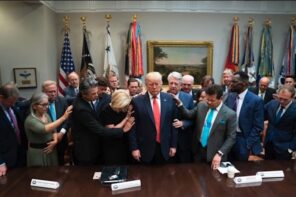Here at Religion Dispatches, we have an informal policy that “religion is as religion does.” Which is to say, we don’t try to adjudicate who is, for example, a “real Christian” and who’s not. If you label your beliefs and practices as “Christian,” and those beliefs are shared by a reasonable number of people, that’s the label we use. It’s not a perfect rule, but then heuristics are only ever meant to work well enough.
I was reminded of this rule after former president Donald Trump addressed the Turning Point USA Faith Conference in West Palm Beach, Florida last month. Political reporters who covered the event might be forgiven for simply calling the conference attendees “Christians.” Not only do few journalists understand all the varieties of Christianity, but in addition the event organizers call themselves Christian, the vast majority of attendees were almost certainly Christians, and Trump himself said he was speaking to “Christians.” So it seems close enough for horseshoes and hand grenades.
Thus we had paragraphs like this from Fox News:
Trump emphasized the importance of Christian voters in the upcoming election, urging the crowd to take to the polls for early voting in their states and to show up on Election Day.
“Christians have to vote, you know. I don’t want to scold you but you know that Christians do not vote proportionately they don’t vote like they should. They not big voters,” Trump said. “If you don’t vote, we’re not going to win the election.”
Or this from NPR:
Trump also urged Christians to turn out for him ahead of Election Day, calling it the “most important election ever.” He added that if elected, Christian-related concerns will be “fixed” so much so that they would no longer need to be politically engaged.
The New York Times did a bit better [emphasis mine]:
At the end of his speech, Mr. Trump urged the religious crowd to vote in November, suggesting that if elected he would address their concerns sufficiently enough that they would no longer need to be politically active. Earlier, he had lamented that conservative Christians do not vote proportionately to their size, a complaint he has made repeatedly in recent weeks.
The problem with coverage like this is subtle; so subtle in fact that you might’ve missed it altogether. Despite their best efforts to depict themselves as speaking to and for Christians at large, neither Turning Point USA nor Donald Trump cares about more than a relatively small portion of the religion’s adherents. That distinction becomes extremely important in light of the growing sense among many expert observers that Trump’s rhetoric is increasingly authoritarian.
Let’s face it: it’s pretty well baked into the culture these days that “Christian” and “conservative” are synonymous. For a lot of reasons, conservative Christians tend to own the cultural megaphone today. (Most important among them: conservative judges endorsing extremist conservative Christian arguments.)
So I don’t expect the average person to understand all the nuances. But journalists covering national politics, especially those on the Trump beat, need to do better.
Here’s why. First of all, it’s a matter of accuracy. As Sarah Posner points out on Bluesky, the best—as in, most accurate—descriptor for the TPUSA conference is “Christian nationalist.” As she notes, “The organizers and participants believe that God intended America to be a Christian nation, and that God’s intent has been subverted by secularism, ‘woke’ indoctrination, abortion, etc.”
And as we know, adherents of Christian nationalism are not the majority of Christians. They’re not even the majority of conservative Christians. Though sympathizers give the ideology a much broader range of support, the hardcore believers such as those represented by TPUSA Faith are a subset of a subset.
If Trump were to address a convention of Log Cabin Republicans, would any reputable journalist describe them simply as “Republicans” with no qualifier? Similarly, if Harris spoke to a group of Democratic Socialists: would they be called “Democrats,” or would they be identified as a left-wing bloc within the party?
Any reasonable interpreter can see that a subset claiming the mantle of the whole is a power grab. It goes for political parties and religious bodies alike. If anyone claims to speak for all Christians, they’re trying to give themselves leverage within a given cultural or political discourse.
Allowing political operators like TPUSA or Trump to elide the difference between “Christian nationalists” and “all Christians” may seem like a minor sin, but it can have enormous consequences. Authoritarian leaders often attempt to justify violence by claiming to protect the values of their faithful citizens, glossing over any differences among those faithful.
Take, for example, Francisco Franco’s regime (a favorite of the authors of a book recently endorsed by VP-hopeful, JD Vance), which aligned itself with the hard-right of Spanish Catholicism, or the role of the Orthodox Church in Putin’s Russia, or God knows how many others. One example most worth noting is Guatemala’s civil war, where wealthy evangelicals have engaged in brutal sectarian repression against poor Catholics in the name of protecting Christian values from Communist threats.
That same protection, complete with bloody, strong-arm repression, is, according to historian Ruth Ben-Ghiat, what Trump explicitly promises his Christian nationalist base. Given what could be done in the name of all Christians, it’s critical to refuse to allow any candidate to claim by default the legitimacy of speaking for the group as a whole.
I know how difficult it is for journalists steeped in the ethic of neutrality to question a candidate’s frames. That’s even more the case when it comes to religion, where passion—and opinions—run high. Yet to allow one candidate to speak to “Christians” without interrogating who that category includes (or doesn’t) is tantamount to a passive endorsement of a political position. Political reporters would never refer to Trump’s opponents as “vermin,” as he did last year. Neither should they refer to the base of his base as “Christians” in an all-encompassing sense.
Punctiliousness is not the point here. Nor is it to wade into the deep waters of what makes a “true Christian,” which only serves to reinforce Christian social hegemony by keeping the focus on the faith in a rapidly disaffiliating society.
Instead, journalists should ask themselves a quantitative question before the qualitative: Trump and his supporters make an implicit assertion that he represents all Christian voters in the United States. But can he or any candidate make a legitimate claim to that effect? That is, does the math add up? If it does, can any candidate therefore make a legitimate claim to speak for “real Americans”?
And most of all: if they can, what do they intend to do with that legitimacy?




